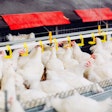
Future innovations in the poultry industry will combine data science with biology, manufacturing and other disciplines to improve and streamline operations, said a trio of presenters during the Virtual Poultry Tech Summit 2020.
The discussion, which took place on October 22, 2020, was moderated by Terrence O’Keefe, content director for WATT Global Media, and featured the following panelists:
- Gary V. McMurray, interim IRIM executive director and associate director, collaborative robotics and division chief, principal research engineer, Food Processing Technology Division, Georgia Tech Research Institute
- David Speller, CEO, OptiFarm
- Scott Carter, Ph.D., vice president of microbials, Phibro Animal Health
At the farm level
There is excitement around sensors, new hardware and other emerging technologies, but ultimately, they’re there to capture the data that is generated. We’ll also need technology to help us implement that data at farm level, Speller said.
“The biggest impacts on health, welfare, productivity and everything else is what you do around the bird, to the bird and for the bird. We are at the beginning of the journey of being able to extrapolate knowledge and there’s going to be a whole world of technology to bring change,” he added.
The most promising technologies will be the ones that help poultry farmers identify the greatest value in their data.
24/7 evaluation with robotics
One discipline getting a lot of attention right now is robotics. Robots can help farmers collect a lot more data through sensors and 3D models that can help predict weight, evaluate welfare and more. It can also collect information about the environment, like temperature and humidity.
Automated solutions also have a place in processing facilities. Robotic solutions developed at Georgia Tech Research Institute are close to matching the speed and accuracy of human workers.
“Typically, we’ve relied on people who are only in the house for a very limited amount of time. Putting a robot in there allows you to get more of a 24/7 evaluation,” McMurray explained.
Effective use of the microbiome
The gut microbiome is one of the most promising areas of research for improving poultry health, albeit one that is still in the earliest stages. Studies have unearthed a lot of data about the microbiome and how it can affect bird health, however new solutions are needed to figure out how the information can be best applied.
“Ultimately, it’s the metadata collected from the farm, processing plant and so forth combined with microbiome information that is really going to unlock our understanding of how to unlock and use the microbiome more effectively to drive poultry production in the future,” Carter said.
Attend the 2021 Poultry Tech Summit
Join an exclusive international gathering of industry-changing innovators, researchers, entrepreneurs, technology experts, investors and leading poultry producers at the 2021 edition of Poultry Tech Summit on October 31 - November 2 in Atlanta, Georgia. Attendees can expect the same groundbreaking innovation and insightful presentations that made the previous events well-attended with deep dialogue on new prospective solutions and developing technologies.
Like what you just read? Sign up now for free to receive the Poultry Future Newsletter.


















